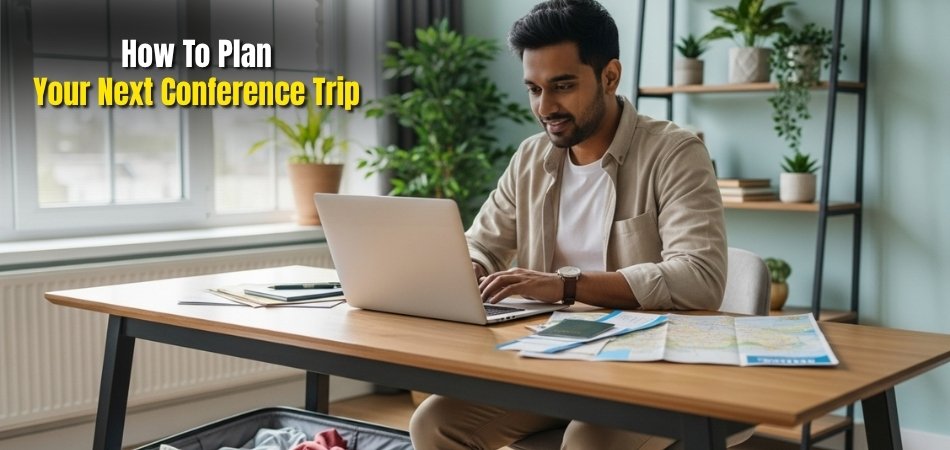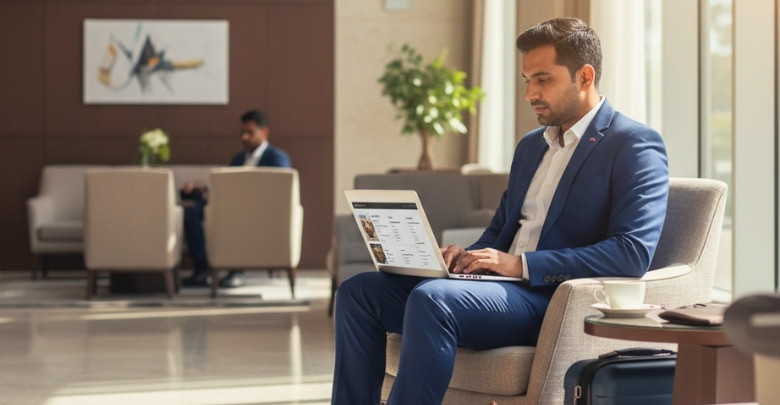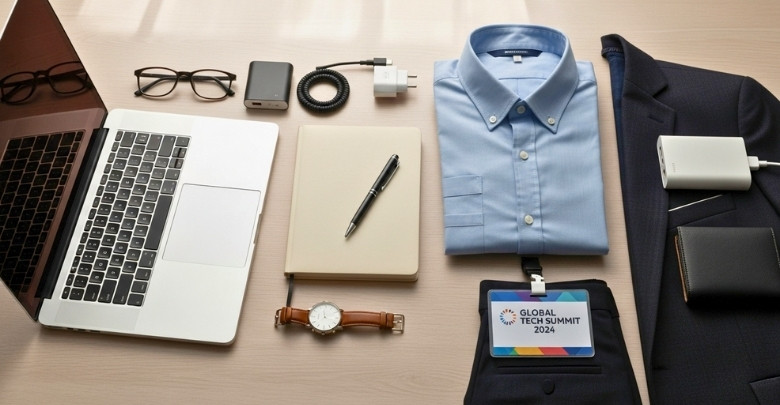A conference trip is more than just travel—it’s a chance to learn, meet new people, and grow your career. But without planning, it can turn stressful. If you’re wondering how to plan your next conference trip, it’s not as complicated as you might think.
You can start planning your next conference trip by setting clear goals and making a budget. Book your flight and hotel early, and try to stay near the venue. Make a schedule for sessions and meetings. Pack items like chargers, business cards, and clothes. Bring your passport and any papers you need. Stay safe and healthy.
Keep reading to explore easy and practical tips that will make your conference trip smooth and successful.
How To Plan Your Next Conference Trip?
It can be challenging to plan a conference trip, but with the right steps, it becomes a lot easier. Good planning helps you stay stress-free and focus on learning, networking, and meeting your goals. Here are the key steps to help you plan your next conference trip successfully:

Set Clear Objectives
- Think about why you want to attend the conference, and write goals that match your professional growth. Clear goals help you focus your time.
- Goals could be networking, learning new industry ideas, or exploring new tools that improve your knowledge and career opportunities.
- With strong objectives, you avoid wasting time and stay centered on sessions, speakers, and meetings that matter.
Plan a Realistic Budget
- Start by adding flights, hotels, meals, and transportation costs into your budget to avoid overspending later.
- Include conference fees, extra events, and unexpected costs, so you remain fully ready for sudden situations.
- Tracking your spending closely during the trip helps you stay within the budget and prevents future financial stress.
Book Flights Early
- Secure flight tickets as soon as you confirm your plans, which ensures better prices and convenient travel schedules.
- Always check baggage limits, refund rules, and travel insurance to avoid problems at the airport later.
- Direct flights save time, reduce stress, and allow more energy for sessions and meetings during the conference.
Choose the Right Accommodation
- Stay close to the venue, since shorter travel saves time, reduces stress, and makes attending sessions more enjoyable.
- Pick hotels with Wi-Fi, breakfast, and quiet spaces, because these features improve your comfort during busy days.
- Early booking gives you better rates and more room choices, ensuring a smooth and affordable stay.
Arrange Local Transportation
- Plan your commute options before you arrive, including airport transfers, buses, trains, or car-sharing services nearby.
- Having transport sorted reduces last-minute worries and makes your daily routine easier to manage.
- If traveling with colleagues, group transport saves money, improves coordination, and makes the trip more enjoyable.
Organize a Conference Schedule
- Use apps, notebooks, or calendars to track sessions, workshops, and networking events throughout the conference.
- Pick sessions that match your goals and leave extra time for breaks, reflection, or meeting new contacts.
- A clear plan helps you avoid rushing, manage your energy, and enjoy each moment more fully.
Prepare Important Travel Documents
- Check your passport, visa, and insurance well before the trip to avoid sudden and stressful problems.
- Keep digital copies saved securely online, which helps you recover information quickly in emergencies.
- Carry printed copies of confirmations, passes, and contacts to ensure smooth travel and check-in.
Pack Smartly and Efficiently
- Add essentials like business cards, chargers, and notebooks so you remain productive throughout your stay.
- Professional clothing boosts confidence, while comfortable shoes help you handle long days easily.
- Avoid overpacking by choosing items you will actually use, saving luggage space and travel energy.
Prepare for Meetings in Advance
- Review schedules, confirm appointments, and learn about attendees to make every meeting more meaningful.
- Carry materials like slides, reports, or presentations to ensure smooth discussions.
- Being well-prepared shows professionalism, builds trust, and creates stronger networking connections.
Focus on Safety and Health
- Research health requirements, including vaccines or local safety tips, to protect yourself during international travel.
- Bring medicines, sanitizer, and healthy snacks, which help you stay active and prevent sickness.
- Register with your embassy when traveling abroad for added protection and reliable emergency support.
Every conference trip is a mix of learning, connecting, and growing, but only good preparation makes it successful. From setting goals to arranging transport, these steps ensure smoother experiences. For instance, many travelers plan early when exploring upcoming conferences in USA, just like they do when visiting countries such as Germany, Singapore, or the UK. Following this approach saves stress and brings maximum value from the entire journey.
Why Should You Plan Ahead for Your Next Conference Trip?
Sometimes a conference trip sounds exciting, but it can feel confusing without any clear plan in your mind. Many people rush to book travel, forgetting important details that later cause stress and wasted money. A little preparation saves time, energy, and makes the entire trip smoother. Here are the main reasons why planning ahead makes your conference trip smoother and more successful:
Clear Goals
Planning ahead helps you think about what you want from the conference. Maybe you want to meet new people or attend special sessions. Goals make you spend your time wisely and avoid wasting energy. When you know your purpose, every day feels more useful.
Better Budget
A budget keeps your money safe and your spending under control. Conferences often cost more than you first expect. When you plan, you can include flights, hotels, and food. This way, you stay relaxed and avoid last-minute surprises.
Early Bookings
Flights and hotels usually get expensive if you wait too long. Planning early helps you grab better deals and locations. A hotel near the venue saves travel time every day. Early booking gives peace of mind and more choices.
Organized Schedule
A conference can have many sessions at the same time. Without planning, you may miss the ones you need. A clear schedule tells you where to be and when. This simple step makes the trip less stressful.
Important Documents
Passports, tickets, and conference passes are not things to forget. Planning gives you time to check everything. Keeping copies of documents in your bag and phone helps if you lose something. Good preparation avoids panic at the airport or venue.
Smart Packing
Packing is easier when you think about it ahead of time. You can make a checklist to avoid missing items. Chargers, clothes, and business cards should always be ready. Planning makes your bag lighter and your trip simpler.
Health and Safety
Planning ahead means thinking about your health as well. Bring any medicine you need and stay hydrated during travel. Knowing local safety tips helps you feel more confident. A little care makes the whole trip more enjoyable.
How to Plan Your Conference Schedule?
A conference can be exciting but also a little overwhelming if you don’t know where to start. Many people feel confused when they see so many sessions happening at the same time. Without planning, it’s easy to miss the events that really matter. Here are some practical steps to help you plan a conference schedule that truly works for you:
Know Your Goals
Before you plan your schedule, decide what you want to get from the conference. Some people focus on learning new skills, while others look for meeting important contacts. Knowing your purpose helps you pick the right sessions. This step keeps you from wasting time on things that don’t help.
Check the Agenda
Every conference has a program or agenda that lists all events. Spend time reading it carefully before the conference begins. Highlight the topics or speakers that connect with your goals. Doing this helps you find the sessions you must attend.
Mark Priority Sessions
There may be many talks happening at the same time. You cannot attend everything, so you must choose wisely. Select the sessions that are most important and note them clearly. This keeps your day structured and focused on what matters most.
Balance Your Time
It’s not healthy to pack your schedule too tightly. Breaks are important for rest and clear thinking. Leave gaps between sessions to recharge or grab a quick snack. A balanced schedule gives you more energy to enjoy the conference.
Include Networking
Conferences are not only about lectures or workshops. They are also great places to meet people and build connections. Plan time to attend meetups or group discussions. These moments can bring learning and chances you don’t find in sessions.
Prepare for Travel
When you plan your schedule, think about travel within the conference city too. Knowing the location of venues saves you time and stress. This is where following the essential travel advice for conferences can make your overall planning smoother. With both travel and sessions planned, your days feel organized and simple.
Stay Flexible
Even the best schedule may need changes at the last moment. A speaker might cancel, or a new event may appear. Be open to adjusting your plan without stress. Flexibility allows you to take advantage of new opportunities.
What Networking Opportunities Should You Prioritize?
Conferences are not only about talks and learning. They are also about meeting people and making friends. Simple planning can help you meet the right people. With small steps, you can build strong and useful connections. These are the networking opportunities you shouldn’t miss:
- Keynote Sessions: Big talks gather many people, so you can meet others who like the same topics and ideas. Short chats after the session often help you find friends who share your goals and thoughts.
- Workshops: Workshops are small, and people talk more openly, which makes it easier to connect. Joining activities shows you care, and others will remember you better.
- Panel Talks: Panel events bring experts together and attract many listeners who want to talk more. Meeting panelists or other attendees after gives you extra chances to connect.
- Break Times: Coffee or lunch breaks are relaxed and friendly, so talking feels easier. These simple talks often lead to strong bonds.
- Exhibit Booths: Exhibit halls show new products and companies, giving you chances to meet many people. Asking questions makes others see you as curious and friendly.
- Social Nights: Mixers or dinners let people talk in easy settings without the stress of sessions. These talks often turn into long-term friendships.
- Small Groups: Study or discussion groups after sessions help you share ideas with others. Talking in small circles builds stronger trust and friendships.
How to Budget and Track Expenses for Conference Trips?
Attending a conference can be exciting, but costs add up quickly without planning. Setting a budget helps you spend wisely. Tracking expenses keeps you aware of where money goes. With basic planning, you can enjoy the trip, learn more, and avoid financial stress. Here are simple ways to manage your conference budget.
Budgeting for Conference Trips
Without planning, you might spend more money than needed and face stress later. A smart budget makes your trip smoother, easier, and stress-free.
List Major Costs
Start by writing down all the main costs you will face during the trip. These often include travel, hotel, food, and registration fees. Do not forget small items like taxis or snacks, which can add up. Listing everything gives you a clear picture before you spend.
Research Prices
Look up the cost of flights, hotels, and meals in the city where the conference happens. Comparing prices helps you pick cheaper but reliable options. Some hotels near the venue may offer discounts for conference guests. Doing this research early saves both money and time.
Set Realistic Limits
Create a budget for each spending area, and make sure the total fits your available funds. Always keep limits realistic so you don’t struggle later. Include a little extra for unexpected costs like delays or extra meals. This makes your budget safer and more practical.
Use Budget Tools
Templates and budget apps can make planning much easier. They help you track all categories clearly and avoid forgetting things. A checklist is simple but very effective for keeping everything organized. Having the budget written down makes it easier to follow.
Plan Extra Buffer
It’s smart to add a small buffer amount for sudden costs. Things like flight changes or emergency purchases often surprise travelers. Having extra money ready keeps you safe from these situations. You can continue your trip smoothly without cutting into other planned expenses.
Align with Rules
If your trip is supported by your school, company, or organization, check their funding policies first. Some may cover specific expenses, but not others. When going abroad, it helps to think about effective international travel planning for Conference to match your budget with travel rules. Preparing this way keeps your budget fair and acceptable.
Tracking Expenses During and After the Trip
Many people overspend because they don’t keep track of their costs during the trip. Careful budgeting helps you enjoy without worrying about expenses later. With a clear plan, you can save money and focus on learning.
Set Clear Goals
Before making a budget, decide why you are going to the conference. Goals like learning or networking help guide your spending. If you know what matters most, you avoid wasting money on less important things. Clear goals also keep you focused throughout the trip.
Plan Major Costs
The biggest costs are usually flights, hotels, and registration fees. Write down how much each of these will cost. Booking early often gives you better prices and more options. Knowing these amounts helps you shape the rest of your budget easily.
Track Daily Spending
Small costs like snacks, taxis, or tips can add up quickly without notice. Write down everything you spend each day. Using an app makes it easier to record costs and keep receipts safe. Tracking daily helps you stay within your limits.
Organize Expenses
Divide your spending into groups like food, transport, and lodging. Clear categories make it easier to see where money goes. This also helps when your school or company asks for expense reports. Simple organization reduces stress after the trip ends.
Review After Trip
When the conference ends, look at your total spending compared to your budget. Find areas where you stayed within limits and areas you overspent. This review helps you plan better for the next conference. Each trip teaches you smarter ways to save.
How to Find and Secure a Good Accommodation Close to the Conference in Advance?
Traveling for a conference becomes much easier when you find the right place to stay near the venue. Good accommodation saves time, reduces stress, and helps you focus more on the event itself. Planning early and making smart choices gives you both comfort and value. These tips will help you book a good stay close to the venue in advance:
Research Nearby Options
- Look at hotels, rentals, or serviced apartments close to the venue, since short travel improves convenience and reduces stress.
- Use booking sites, travel blogs, and maps to compare locations, ensuring your choice makes your stay smoother and easier.
Check With Organizers
- Many conferences partner with nearby hotels, giving attendees discounted rates and deals when they book directly through organizers.
- Contacting organizers early may reveal hidden offers or limited-time arrangements, saving money while ensuring comfort and location advantages.
Compare Prices
- Don’t just look at room rates; check what extras like Wi-Fi, breakfast, or shuttles are included in offers.
- Comparing several properties early helps you find better options, balancing cost with comfort for a stress-free stay.
Book Early
- Hotels close to large venues often fill quickly, so booking several months ahead secures availability and better prices.
- Early booking also provides more choices, making it easier to find suitable locations with desired features included.
Ask for Recommendations
- Talking with colleagues or past attendees helps you find reliable places that have already proved comfortable and convenient for others.
- First-hand advice saves time and avoids mistakes, giving you confidence when making important accommodation choices.
Consider Alternatives
- Apartments or vacation rentals often provide more space and flexibility, which is useful for longer trips or group travel.
- Alternative stays may also include kitchens or laundry, reducing costs for meals and helping with longer schedules.
Look for Amenities
- Choose places with free breakfast, Wi-Fi, or shuttles, as these extras make your trip simpler and less stressful.
- Amenities often improve your experience, ensuring you have everything you need without paying more outside the hotel.
Review Policies
- Always check cancellation rules, because flexible options allow changes if plans shift or emergencies come unexpectedly.
- Refund policies protect your budget, making sure you don’t lose money when adjustments become necessary later.
Think About Accessibility
- Pick an accommodation that fits your needs, including elevators, ramps, or transport access if you require special arrangements.
- Easy accessibility ensures comfort and independence, preventing unnecessary stress during the busy conference schedule.
Use Booking Agencies
- Specialized travel agencies can manage group bookings, negotiate discounts, and handle details when you’re traveling with colleagues.
- Agencies save effort by finding deals you might miss, especially when large events crowd nearby hotels quickly.
Best Ways to Manage Travel Logistics for a Conference in Advance
The best ways to manage travel logistics for a conference in advance involve thorough planning, early bookings, clear communication, and contingency preparation. Here are the key practices for managing travel logistics:
- Book Accommodations Early: Secure reasonably priced hotels close to the conference venue to reduce commute time and ensure convenience. Look for amenities like Wi-Fi, meeting rooms, and proximity to transportation hubs.
- Schedule Transportation Early: Arrange airport transfers, shuttles, or group transportation well in advance to avoid last-minute issues and high costs. Coordinate arrival and departure times to ensure timely attendance.
- Consider Accessibility Needs: Provide transport options for attendees with disabilities or special requirements to ensure inclusivity.
- Plan Multiple Routes and Vehicles: Allocate vehicles based on group sizes and provide alternative routes to handle traffic or delays.
- Coordinate Crowd and Time Management: Organize pick-up points and departure schedules to minimize congestion and waiting times.
- Communicate Clearly: Inform attendees ahead of time about travel arrangements, contact info, and any changes. Keep open channels for real-time updates.
- Prepare Contingency Plans: Anticipate unforeseen circumstances like weather disruptions or schedule changes, and have backup transportation and flexible plans ready.
Using these strategies, supported by professional partners or specialized travel/logistics services, ensures stress-free, efficient conference travel logistics, enhancing overall attendee satisfaction.
What Should You Pack for the Conference?
Attending a conference means being ready to learn and connect with new people. Packing the right items saves time and avoids stress. Essentials like clothes, chargers, and documents make travel easier. With a simple checklist, you can stay prepared and focus fully on the conference experience. Here is a comprehensive list of what to pack for a conference:
Essential Conference Items
- Registration documents, tickets, and conference agenda (digital or printed).
- Business cards for networking.
- Notebook and pens or a tablet/laptop for note-taking and presentations.
- Chargers, power banks, and adapters for electronic devices.
- USB drives for file sharing and backups.
Clothing and Accessories
- Business casual attire or according to the conference dress code (e.g., blazers, dress pants, skirts, polo shirts).
- Comfortable yet professional shoes.
- Layers such as sweaters or jackets to adjust to varying room temperatures.
- An extra outfit for emergencies or evening events.
- Accessories like ties, scarves, or jewelry to complete the professional look.
Personal Care and Health
- Toiletries (toothbrush, toothpaste, deodorant, shampoo, etc.).
- Travel-sized hand sanitizer, tissues, and lip balm.
- Any necessary medications, pain relievers, vitamins.
- Comfortable sleep aids like earplugs or eye masks if needed.
Technology and Miscellaneous
- Phone and smartphone accessories (chargers, cables, power banks).
- Laptop/tablet and related accessories like a mouse or keyboard.
- A sturdy conference tote or backpack for carrying essentials.
- Snacks and a refillable water bottle to stay energized.
Optional Useful Items
- Portable charger or power strip.
- Travel pillow or comfort items for transit.
- Extra bag for swag or materials collected at the conference.
Frequently Asked Questions about Planning Ahead for Next Conference Trip
Planning a conference trip often brings many small questions that people forget to ask until the last moment. Having answers to these questions makes the entire process much easier. Here are some helpful FAQs to guide your planning.
How Early Should You Register for a Conference?
Registering early ensures you secure a spot, avoid price hikes, and get better accommodation choices near the venue. Early registration also helps with planning travel dates, budgeting expenses, and preparing documents without feeling rushed later on.
Should You Contact Speakers Before the Conference?
Reaching out to speakers before the conference helps you introduce yourself and build stronger connections during sessions. Sending a short, polite message shows interest in their work and increases your chances of having meaningful conversations at the event itself.
Is It Worth Arriving a Day Early?
Arriving one day early gives you time to rest, explore the venue, and adjust to travel delays. This also allows you to check in calmly, review your schedule, and start the conference fresh without feeling tired or stressed.
How Can You Manage Meals During Conferences?
Meals at conferences can be expensive or time-limited, so planning is smart. Check if your hotel includes breakfast, and explore nearby dining options. Carry small snacks to stay energized between sessions, and leave time for proper meals each day.
What Payment Methods Should You Carry?
Carrying both cash and cards is useful since not all places accept the same payment methods. Cash helps with transport, tips, and snacks, while cards are safer for larger expenses. Always keep some emergency money in a separate spot.
Should You Share Accommodation With Colleagues?
Sharing a room with colleagues can save money, but requires comfort with the arrangement. If privacy matters, book separately. Discuss expectations clearly beforehand to avoid misunderstandings and ensure both comfort and convenience while attending sessions or relaxing after events.
How Do You Handle Jet Lag for International Conferences?
To manage jet lag, adjust your sleep schedule a few days before departure. Drink water, avoid heavy meals during flights, and spend time in sunlight after arrival. These small steps help your body adapt quickly and keep your energy steady.
What Kind of Bag Should You Carry?
A light backpack or messenger bag works well because it fits essentials like chargers, notebooks, and water bottles. Choose one with multiple compartments for organization, so you can carry items easily without struggling during sessions or moving between events.
How Can You Stay Connected During the Conference?
Good internet access is important for staying connected with colleagues or updating schedules. Confirm hotel Wi-Fi, and bring a portable hotspot if needed. Always keep power banks handy, so your devices stay charged throughout long days filled with activities.
What Should You Do After the Conference Ends?
After the conference, organize notes, save contacts, and send follow-up messages to people you met. Reviewing what you learned helps you remember key insights. Sharing highlights with your team or friends also makes the trip more rewarding and meaningful.
Final Thoughts
Planning a conference trip is not hard when you take small steps. Booking flights and hotels early saves money and time. Keeping your documents, budget, and schedule ready helps you avoid stress. Knowing how to plan your next conference trip makes everything smoother.
Packing the right things, staying healthy, and preparing for meetings bring more confidence. With simple planning, you can focus on learning, meeting new people, and enjoying the event. A little effort before the trip makes the whole experience better, leaving you with good memories and useful connections.








